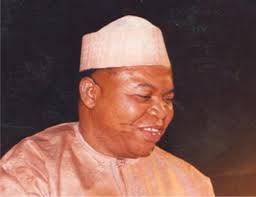Early results of the Kogi State governorship election held across the state have begun to trickle in from the wards with the candidate of the All Progressives Congress, APC, Abubakar Audu establshing an early lead.
The Rainbow gathered that Audu beat his his main rival Governor Idris Wada of the People Democratic Party.
Wada is already complaining of defects in the conduct of the elections.
According to unofficial figures from different parts of the state, the first civilian governor of the state, who is seeking a return to the top job, have won in most of the local government areas in the Kogi West Senatorial District.
These are Yagba East, Mopa-Moro and Ijumu while incumbent Governor Idris Wada won in Yagba West and Kabba-Bunu.
It was also learnt that Audu was also leading in six of the nine local government areas in Kogi East where he and Wada come from.
Rampant failure of Smart Card Readers, threats from miscreants loyal to certain political parties, apathy occasioned by far-distance citing of polling units from residential areas, were some of the teething challenges that confronted the Kogi governorship election yesterday in most parts of Lokoja, the state capital.
Meanwhile, reports from various polling units in the state capital indicated that though the Independent National Electoral Commission (INEC) performed creditably well in ensuring early arrival of electoral materials, some of the card readers deployed either failed to read the fingers of the candidates or developed other operational problems.
The situation led to outright abandonment of the card readers for Incident Forms in some polling units like 006 Adankolo, LGEA Primary School and Ajagbe Ward, where incidentally the turnout of voters was low.
Kasim Husain, an INEC accredited local observer at Ajagbe Ward lamented that the situation left the electoral officers with no other option than to resort to the use of Incident Forms to complement the two remaining machines.
“The only visible problem we have in this ward was the problem of failure of a Card Reader. INEC supplied three machines to this polling centre because it is one of the largest in the state capital, but one of them developed problem that they had to resort to the use of Incident Forms and the other two machines,” he noted.
However, beyond the failure of card readers, there was also obvious case of open threats from some political thugs who threatened security agents to leave their duty posts and allow them take charge of the election totally in Adankolo ward.
Hoodlums openly threatened to open fire on anybody who tries to stop them, or risk being attacked.
“We will shoot anybody who tries to stop us. We want the police to leave here because our candidate must win this election. Don’t force me to bring out this gun,” one of them said, trying to raise his t-shirt to reveal the gun.
Commenting on the situation, a Justice and Equity Organisation accredited local observer, Bafunso Tunde, said: “After going round over 25 polling units in five local government areas, I can tell you that the biggest challenge was the failure of the card reader. By my rating, card reader performed below 20 per cent, which forced INEC to resort to the use of Incident Forms to cover-up the problem.
“Besides the card reader, with the prevailing security situation, we have to amend the law stopping security agents in charge of securing the voting centres from carrying arms. At this Adankolo Primary School, there were about seven boys that threatened the law enforcement agents with guns, they claimed they were carrying, ordering them to leave the voting centre and allow them to operate the way they want or they will start shooting.
“They jumped the fence and left after the threat and everybody pretended as if nothing happened. Nobody accosted them certainly not even the armless policemen and there were no armed security personnel around to complement the armless ones,” he quipped.
In most voting centres, there were physical fighting and harassments among many of the voters interested in benefitting from the financial largesse openly shared by the agents of political parties assigned for that purpose in most parts of the voting centres.
There were also reports of money inducement for votes ranging from N2000 to N500 as lowest benchmark from the parties scheming to outsmart each other.
A voter who spoke to a reporter in confidence, said: “The N500 you saw them sharing at the voting centres are for those that did not stay awake on Friday night.
“As at 1.00am to 3.00am, some of the political parties gave amounts ranging from N3000 to N5000 as cash for vote, but it was for only those who could stay that late that benefitted. We have to collect that money because once they win the election, they won’t care about us any longer. This is our own national cake,” he quipped.












